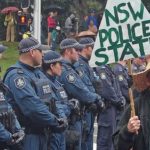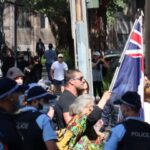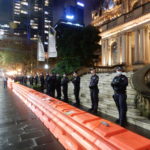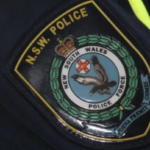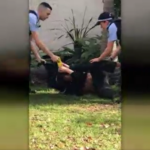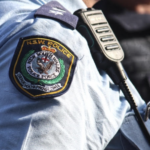The NSW Police State: Excessive Force, Lethal Assault, Strip Searches and Dog Monitoring
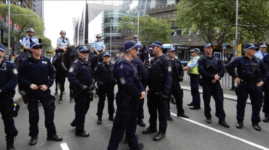
The lethal tasering of 95-year-old Clare Nowland, who, suffering dementia, was holding a steak knife and approaching a NSW police senior constable at such a pace with the aid of her walking frame that he felt he had no choice but to stun her, has again highlighted the use of excessive force by police.
The 17 May incident is an extreme case of excessive use of force. But to emphasise that “daily” is the correct adjective to apply to such incidents, rather than “isolated”, on the 25th, officers shot a man, having a mental health episode and holding two knives. four times, when tasering was an option.
As for NSW police excessive use of force being a long-term issue, Channel 7 released footage this week of a 2020 incident involving another senior constable brutally bashing an unarmed father, on his way to the police station to report an incident, on a suburban street in front of his 7-year-old son.
This latest incident was simply an example of average on-the-street community policing in the state of NSW, which, since the turn of the century has also further included the warrantless use of drug dogs in public places, along with ever-increasing strip search use over the last ten years.
NSW Greens MLC Sue Higginson has repeatedly made clear that this state has a policing problem, since the officer at a nursing home cut one resident’s life short.
Yet, when you accompany this recent incident involving the death of Nowland, with the use of highly flawed sniffer dogs, arbitrary strip searches and the odd bloodlust beating on a civilian, NSW can certainly be classed as an actual police state.

Ditch the dogs
“It is fair to say that community trust in policing in NSW is at an all-time low,” Higginson told Sydney Criminal Lawyers. “We need an approach to policing that isn’t based on fear, the use of force, targeting people or the use of sniffer dogs.”
“Policing should be strategic and responsive to community needs,” she added. “The use of dogs in the war on drugs, particularly targeting personal and recreational use, has failed and is harmful, as well as extremely expensive.”
The warrantless use of drug dogs in public places officially commenced in early 2002. And the 2006 Ombudsman report revealed, as have numerous later statistics, that the dogs get it wrong at least two-thirds of the time and when they do find something, it’s usually a small quantity of cannabis.
Sniffer dog use predominantly targets less affluent areas, and those with high numbers of First Nations people. And their ever-increasingly use at music festivals, the NSW coroner has found, leads to dangerous drug-taking practices that can prove fatal, as young people attempt to avoid detection.
“We’re seeing violent actions by police far too regularly, an increase in police weaponry and the presence of police dogs in community settings just worsens this,” Higginson underscored.
Akin to sexual assault
The NSW Greens and the Redfern Legal Centre have long been monitoring the rise of strip search use by NSW police, which are often carried out unlawfully by officers unaware of correct protocols. And they’re regularly used on teenagers at music festivals, and on First Nations kids as young as 11.
A 2019 RLC-commissioned UNSW report found there had been a twentyfold increase in strip searches since 2006. And Greens-sourced data found of 19,000 strip searches performed by NSW police over the four years to June 2018, 64 percent had turned up absolutely nothing illegal.
“We need to end this damaging practice with urgency,” said Higginson. “Under the previous government we saw an expansion of police powers and policies that are hurting communities – strip searching anyone is damaging and degrading but doing it to children is a human rights violation.”
“We have seen an increase in the incidents of strip searches in recent years and alarming revelations about internal targets police set for the number of strip searches conducted – this is not the work we want the police to be doing,” the Greens justice spokesperson added.
Getting teens to drop ‘em
A spike in strip search use to accompany failed pat downs after dog indications started mid-last decade, around the time, the presence of dogs and the invasive procedure became a prominent feature at festivals. And this is when drug-related deaths spurred by dog presence began too.
Then, in 2019, NSW police even deployed screens to Central Station, so as to give commuters being told to strip off some privacy. That’s if one considers two armed strangers ordering someone to get naked and then squat and cough, sounds like privacy and not some form of sexual assault.
“In 2020, the Law Enforcement Conduct Commission released its report from its Inquiry into NSW Police Force strip search practices that made a suite of recommendations aimed at limiting the powers of police to conduct strip searches,” Higginson remarked.
This investigation found instances of officers ordering 15-old-boys to lift their genitals to get a good look underneath, while one officer went as far as reaching inside a boy’s underwear. And there’s even been an incident involving a young woman being told to remove her tampon whilst unclothed.
Indeed, many believe that inaugural LECC chief commissioner Michael Adams KC was stood down after his first term as he went the NSW Police Force too hard in terms of the strip search investigation.
“The recommendations included operational changes that meant general intelligence about drug use or offences should not be enough for individuals to be strip searched, particularly in music festival settings,” Higginson advised.
“We need to also consider the scale of the resources being used for this kind of destructive work. These are resources that should be used in building our communities, not the harmful policing of them.”
Thugs in blue nylon
Higginson said it’s about time the obvious policing problem in this state, which the public shouldn’t be accepting, be brought to an end, as the priority of the NSW Police Force “should be about keeping communities safe, including those who are vulnerable”.
But for some reason, one of the largest police forces on the planet, which oversees a relatively small populace that in no way warrants such a huge organisation, isn’t keeping the community safe, instead it approaches it as if all civilians are criminals and committing assault offences against the vulnerable is perfectly acceptable.
“We’ve seen police target young people at music festivals, protestors who are seeking to influence the democratic process in relation to climate change and lethal force used on vulnerable people,” the Greens member made plain.
Former NSW officer Jay Maleckas, who lost his appeal against his assault conviction over bashing Steve McIvor this week, is seen in the footage going directly over to his victim’s son and comforting him. And the boy then asks the uniformed thug if he could refrain from shooting his father.
Higginson explained that whilst it’s important to hold individual police officers, like Maleckas, to account for the crimes they’ve committed, this is simply a band aid approach that doesn’t “fix the root of the police problem”.
“I’m taking steps to establish a NSW parliamentary inquiry into policing that can examine where we’re going wrong and what’s needed to reform policing in NSW,” the Greens MLC said in conclusion.
“This is a necessary step along the path of developing the much-needed better approach to policing in NSW.”


